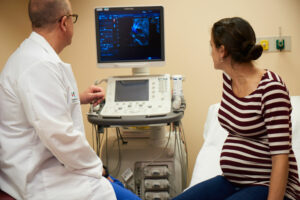Early Gestational Fetal Imaging Gives Timely Insight into CHD
 Conventional fetal cardiovascular imaging—fetal echocardiography—is typically done at 18 to 24 weeks of gestation, or at the end of the second trimester, allowing doctors to view the structure and function of a baby’s heart and diagnose most Congenital Heart Defects (CHDs). In recent years, however, it is now possible at even 12 to 14 weeks of gestation in certain high-risk pregnancies.
Conventional fetal cardiovascular imaging—fetal echocardiography—is typically done at 18 to 24 weeks of gestation, or at the end of the second trimester, allowing doctors to view the structure and function of a baby’s heart and diagnose most Congenital Heart Defects (CHDs). In recent years, however, it is now possible at even 12 to 14 weeks of gestation in certain high-risk pregnancies.
“Advances in ultrasound equipment and technology and increased operator expertise and experience has made accurate imaging of the fetal heart possible at earlier stages in pregnancy,” said Erik Michelfelder, MD, pediatric cardiologist and Director of the Fetal Cardiac Program.
Advanced ultrasound technology allows for visualization of tiny heart structures only millimeters in size, as well as blood flow patterns very early in pregnancy. At 11 to 14 weeks, it is typically standard of care to perform nuchal translucency screening or maternal blood screening for fetal DNA, which can reveal genetic or chromosomal abnormalities that can be associated with higher risk of CHD. At that time, early imaging may be recommended to learn more.
“Early gestational cardiovascular imaging is similar to a regular ultrasound that a pregnant mom may get at her OBGYN,” Dr. Michelfelder said. “It’s the same process as a standard fetal echo, but the challenge lies in describing cardiac anatomy and function in a much tinier baby.”
While early fetal imaging is not for everyone, it may be recommended for certain high-risk pregnancies, particularly in cases of families already at higher risk for CHD.
“Early imaging allows time for the impact of a diagnosis to sink in,” Dr. Michelfelder said. “It allows time for further genetic evaluation to be completed and for discussions about the implications of the diagnosis, likely outcomes and possible treatments to take place.”
Resources:
CHOA’s Fetal Cardiology program
Meet the Fetal Cardiology team
For more information about Children’s Healthcare of Atlanta Cardiology and our pediatric cardiology specialists, click here.
